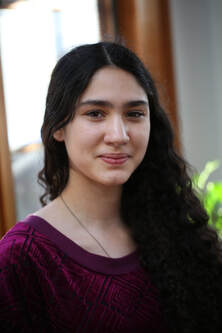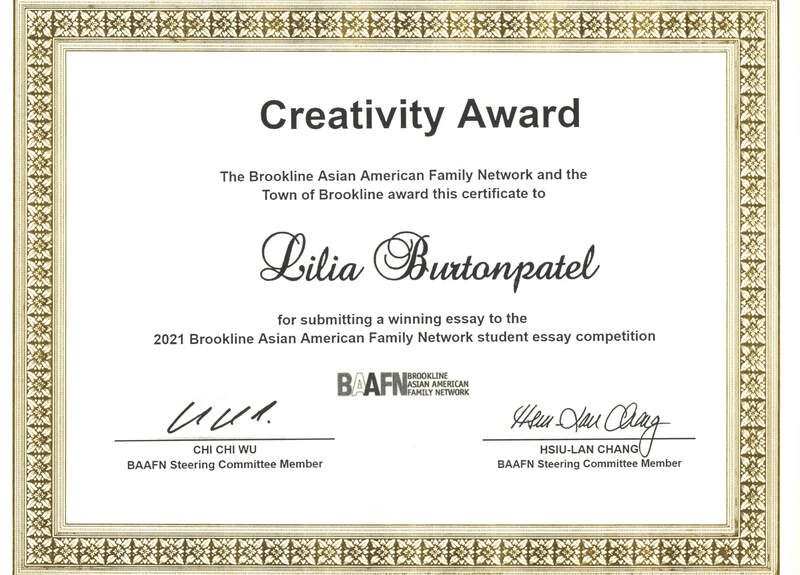2021 BAAFN Creativity Award
Intertwined
by Lilia Burtonpatel
by Lilia Burtonpatel
Being Asian American means having connections. It means having family across the world, books in your home
with stories your friends don’t know, the feeling that you can belong in two places at once. My life is half India, half America. But it’s not as simple as that.
Being half Indian doesn’t mean your life comes cut cleanly in two. It’s more like two trees that grow together, twisting and intertwining their trunks until they make something unique. My trees have always grown together, since I was born. Though I’ve always lived here, and my culture is strongly from the U.S., I’m still peppered with the spices of India if you lean in close. My first food was rice and dhal. My basement is filled with diwali candles and my house with Ganeshas and hand-worked Indian metal. But the most important connection of all lives within me.
Every year, ever since I was born, I have gone to see my grandmother, my Aaji, in India. In a house of peacocks and monkeys, of rangoli and chapatis, she sat surrounded by gifts and wrapped in a mosquito net that she opened wide with her smile of welcome. It is a double life, and for me, a harmonious one. The trips of camel rides and climbing a giant fig tree that will rest forever in my heart contrasted greatly with my other life, the one I lived most of the year round. And though it was difficult, with jet lag and illness, I wouldn’t have missed one of those trips for the world.
I lost my Aaji, a year ago on her birthday. Seventy-five, and then she was gone, of an unexpected heart attack. For over two decades, she had been partly paralyzed from a stroke, and as the years of my childhood progressed, so did her body’s weakness, until she could no longer welcome my brother and me in her front yard with the traditional garland and greeting. Every time we left, I said goodbye. I never knew which time would be the last one I saw her. I didn’t get to talk to her often in between visits, but I talked with her the day she died. She called to ask me about my choir concert that day. Of all the days for her to call. It was only hours before we heard the news. She found the right time, ten and a half hours away to be able to say hello. Though I haven’t heard from her since, it still feels like I could pick up our phone at any moment and hear her voice.
I miss my Aaji, but most of all I’m scared. I’m scared that the strongest string that tied me tightly back to India has disappeared from the outside world, if not from my heart. This is the first year in my life I haven’t seen her, and the first year I haven’t been to India. It seems as though when my strongest connection was severed, suddenly all connection stopped. With the pandemic, I can’t go to India, and I don’t know when I’ll be able to again. But besides Covid, I don’t know when we’ll really be able to go as a family. We still have people there, but no one that pulls us as my Aaji did. I’m afraid of losing my connection. Of having the memories of dusty streets and honking cars next to cow-pulled carts slip into the hazy memory of childhood.
I will fight for my connections, but some things are out of my control. Her house, the place of peacocks and monkeys, rangoli and chapatis, is no longer ours to visit. I don’t know when I’ll be able to go back and see everything that makes up half of me. All the stories and the places and the food and sounds and smells and stores and loved ones and memories that lie half a world away. I am afraid that without nourishment, that part of my tree will wither. Until all that remains is a stump of decaying memories ridden with holes.
Being Asian American to me means remembering. It means my connections - those within the heart and those without. They break and form, shifting and morphing throughout our lives. I’ve suffered a cut, but my greatest wish is that my tree will still continue to grow, if slower, with the aid of the soul of a woman who gave me so much of her heart.
with stories your friends don’t know, the feeling that you can belong in two places at once. My life is half India, half America. But it’s not as simple as that.
Being half Indian doesn’t mean your life comes cut cleanly in two. It’s more like two trees that grow together, twisting and intertwining their trunks until they make something unique. My trees have always grown together, since I was born. Though I’ve always lived here, and my culture is strongly from the U.S., I’m still peppered with the spices of India if you lean in close. My first food was rice and dhal. My basement is filled with diwali candles and my house with Ganeshas and hand-worked Indian metal. But the most important connection of all lives within me.
Every year, ever since I was born, I have gone to see my grandmother, my Aaji, in India. In a house of peacocks and monkeys, of rangoli and chapatis, she sat surrounded by gifts and wrapped in a mosquito net that she opened wide with her smile of welcome. It is a double life, and for me, a harmonious one. The trips of camel rides and climbing a giant fig tree that will rest forever in my heart contrasted greatly with my other life, the one I lived most of the year round. And though it was difficult, with jet lag and illness, I wouldn’t have missed one of those trips for the world.
I lost my Aaji, a year ago on her birthday. Seventy-five, and then she was gone, of an unexpected heart attack. For over two decades, she had been partly paralyzed from a stroke, and as the years of my childhood progressed, so did her body’s weakness, until she could no longer welcome my brother and me in her front yard with the traditional garland and greeting. Every time we left, I said goodbye. I never knew which time would be the last one I saw her. I didn’t get to talk to her often in between visits, but I talked with her the day she died. She called to ask me about my choir concert that day. Of all the days for her to call. It was only hours before we heard the news. She found the right time, ten and a half hours away to be able to say hello. Though I haven’t heard from her since, it still feels like I could pick up our phone at any moment and hear her voice.
I miss my Aaji, but most of all I’m scared. I’m scared that the strongest string that tied me tightly back to India has disappeared from the outside world, if not from my heart. This is the first year in my life I haven’t seen her, and the first year I haven’t been to India. It seems as though when my strongest connection was severed, suddenly all connection stopped. With the pandemic, I can’t go to India, and I don’t know when I’ll be able to again. But besides Covid, I don’t know when we’ll really be able to go as a family. We still have people there, but no one that pulls us as my Aaji did. I’m afraid of losing my connection. Of having the memories of dusty streets and honking cars next to cow-pulled carts slip into the hazy memory of childhood.
I will fight for my connections, but some things are out of my control. Her house, the place of peacocks and monkeys, rangoli and chapatis, is no longer ours to visit. I don’t know when I’ll be able to go back and see everything that makes up half of me. All the stories and the places and the food and sounds and smells and stores and loved ones and memories that lie half a world away. I am afraid that without nourishment, that part of my tree will wither. Until all that remains is a stump of decaying memories ridden with holes.
Being Asian American to me means remembering. It means my connections - those within the heart and those without. They break and form, shifting and morphing throughout our lives. I’ve suffered a cut, but my greatest wish is that my tree will still continue to grow, if slower, with the aid of the soul of a woman who gave me so much of her heart.



